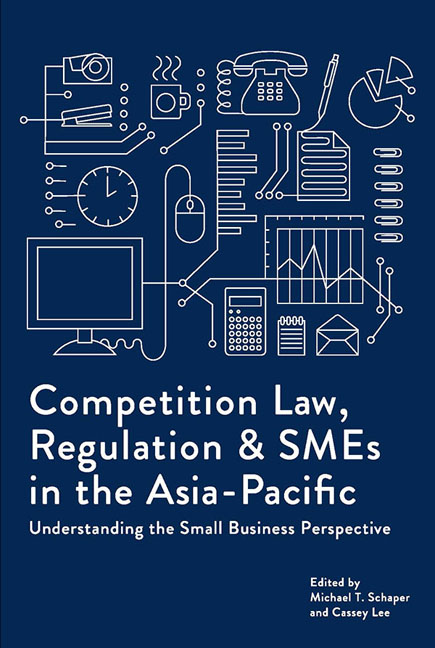 Competition Law, Regulation and SMEs in the Asia-Pacific
Competition Law, Regulation and SMEs in the Asia-Pacific Book contents
- Frontmatter
- Contents
- Foreword
- About the Contributors
- 1 Introduction: Making the Invisible SME More Visible in Competition Policy and Law
- Section 1 Theories And Basic Concepts
- Section 2 Smes And Competition Law
- Section 3 Country Studies
- 12 Competition Law, Regulation, and Trade: Implications for Productivity and Innovation in Singaporean Manufacturing SMEs
- 13 SME Law and Abuse of a Superior Bargaining Position in Japan
- 14 Competition Law, Policy, and Smes in South Korea
- 15 Competition Law Implementation and Smes: Singapore's Experience
- 16 Competition Law and SMEs in Indonesia
- 17 Smes and Malaysia's New Competition Law: Experiences to Date
- 18 Competition Policy and Sme Development in Vietnam
- 19 China's Anti-Monopoly Law and the Sme Sector
- 20 A New Competition Agency Learns to Deal with Smes: The Case of the Hong Kong Competition Commission
- 21 The Regulation of Television Programme Production Contracts under Japan's Subcontract Act
- 22 Small Enterprises and Competition Policy in Pacific Island Countries
- Index
21 - The Regulation of Television Programme Production Contracts under Japan's Subcontract Act
from Section 3 - Country Studies
Published online by Cambridge University Press: 05 August 2017
- Frontmatter
- Contents
- Foreword
- About the Contributors
- 1 Introduction: Making the Invisible SME More Visible in Competition Policy and Law
- Section 1 Theories And Basic Concepts
- Section 2 Smes And Competition Law
- Section 3 Country Studies
- 12 Competition Law, Regulation, and Trade: Implications for Productivity and Innovation in Singaporean Manufacturing SMEs
- 13 SME Law and Abuse of a Superior Bargaining Position in Japan
- 14 Competition Law, Policy, and Smes in South Korea
- 15 Competition Law Implementation and Smes: Singapore's Experience
- 16 Competition Law and SMEs in Indonesia
- 17 Smes and Malaysia's New Competition Law: Experiences to Date
- 18 Competition Policy and Sme Development in Vietnam
- 19 China's Anti-Monopoly Law and the Sme Sector
- 20 A New Competition Agency Learns to Deal with Smes: The Case of the Hong Kong Competition Commission
- 21 The Regulation of Television Programme Production Contracts under Japan's Subcontract Act
- 22 Small Enterprises and Competition Policy in Pacific Island Countries
- Index
Summary
Small and medium-sized enterprises (SMEs) make up more than three-quarters of Japan's corporate landscape. Fostering these small and medium-sized businesses is one of the most important goals of Japan's Antimonopoly Act (AMA). The Act Against Delay in Payment of Subcontract Proceeds, etc. to Subcontractors (The Subcontract Act of 1956) was enacted as a complement to the AMA to enable Japan's Fair Trade Commission to regulate the abuse of superior bargaining positions. In this chapter, the broadcasting industry is used as a case study of how the Subcontract Act can affect SMEs in a particular industry.
Introduction
Japan's Antimonopoly Act (AMA), introduced in 1947, has been used as a means of regulating the transactions between big corporations and small and medium-sized enterprises (SMEs) in many industrial fields. The purpose of the Act is to institute a framework for competitive behaviour in which SMEs are not merely the object of government protection, but are also encouraged to acquire competitive power by their own efforts.
SMEs make up more than three-quarters of Japan's corporate landscape, and fostering these small and medium-sized businesses has been one of the most important parts of the AMA. The legislation prohibits “unfair trade practices” (Article 19), such as the abuse of a superior bargaining position, and is one of the most important provisions in the Act relevant to SMEs.
The Act Against Delay in Payment of Subcontract Proceeds, etc. to Subcontractors (also known as the Subcontract Act of 1956) is a statute that was enacted as a complement to the AMA, in order to enable immediate action by Japan Fair Trade Commission to regulate the abuse of superior bargaining position. The most important point of this legislation is a requirement that an enterprise has to immediately deliver to its subcontractor a written statement setting forth key parts of the contractual arrangements that have been agreed upon. This can include items such as the nature and contents of work to be performed, the amount to be paid, the date of payment, and the method of payment. This Act also prohibits certain conducts, such as delays in payment (without a valid reason) by main subcontracting entrepreneurs.
- Type
- Chapter
- Information
- Competition Law, Regulation and SMEs in the Asia-PacificUnderstanding the Small Business Perspective, pp. 359 - 369Publisher: ISEAS–Yusof Ishak InstitutePrint publication year: 2016
